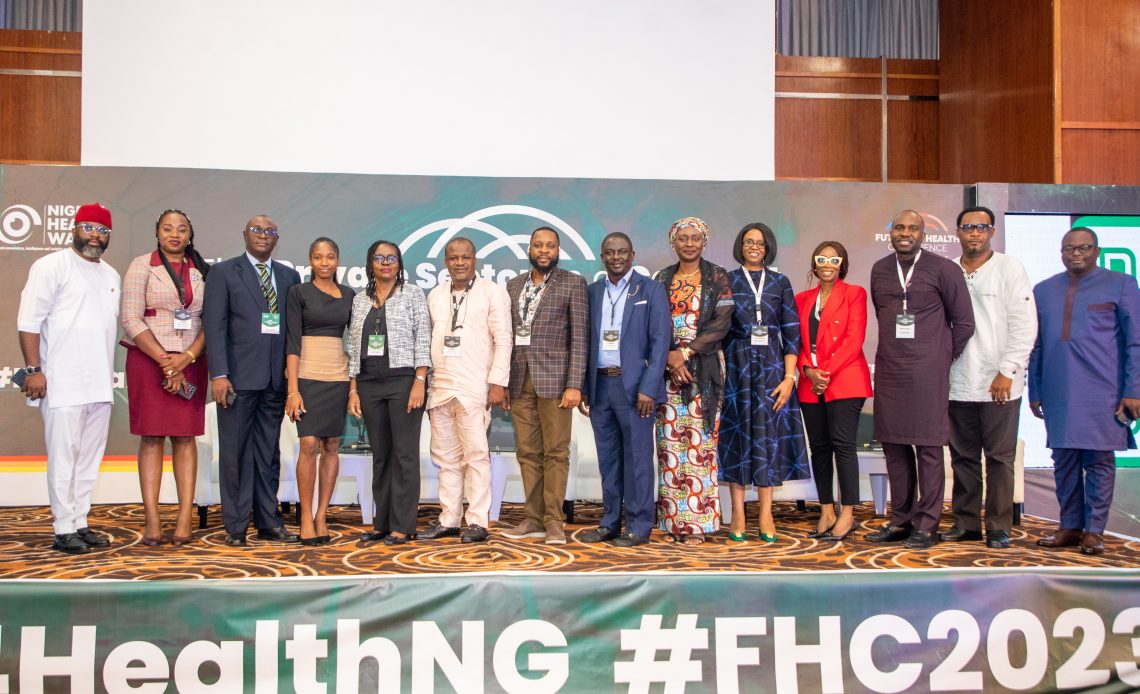Ohanu Dabri Olohije and Asari Ndem (Lead Writers)
The Nigerian healthcare system continues to face challenges, including poor health outcomes, the emergence of infectious diseases and the international migration of health workers. Addressing the myriad of health issues will require multi-sectoral collaboration and partnership between the public and private to build a resilient healthcare system in Nigeria.
The 2023 Future of Health Conference titled “The Private Sector as a Catalyst for a Resilient Health System” brought together stakeholders to “articulate” the aspirations of various role players within the public and private sector.
The private sector’s response during the COVID-19 pandemic through coalitions like CACOVID and other stakeholders in the private sector demonstrated their critical role in strengthening the Nigerian health system and the need to actively engage the private sector as critical stakeholders in the provision of healthcare. In 2019 private expenditure on health accounted for 71% of total health expenditure in Nigeria.
In the last nine years, delivering on the goal to generate ideas to be translated into decisive action to improve health outcomes, Nigeria Health Watch has brought issues affecting the health sector to the forefront, convening the Future of Health Conference annually. This year, the conference focused on innovation within the health sector and promoting partnerships between the public and private sectors in the country. “We started this event nine years ago with the ambition to use it, more than anything else, as a platform to convene critical stakeholders and decision-makers, in addition to creating a platform for focused engagement on many of the health issues we face in Nigeria,” explained Vivianne Ihekweazu, Managing Director of Nigeria Health Watch in her welcome remarks at this year’s conference.
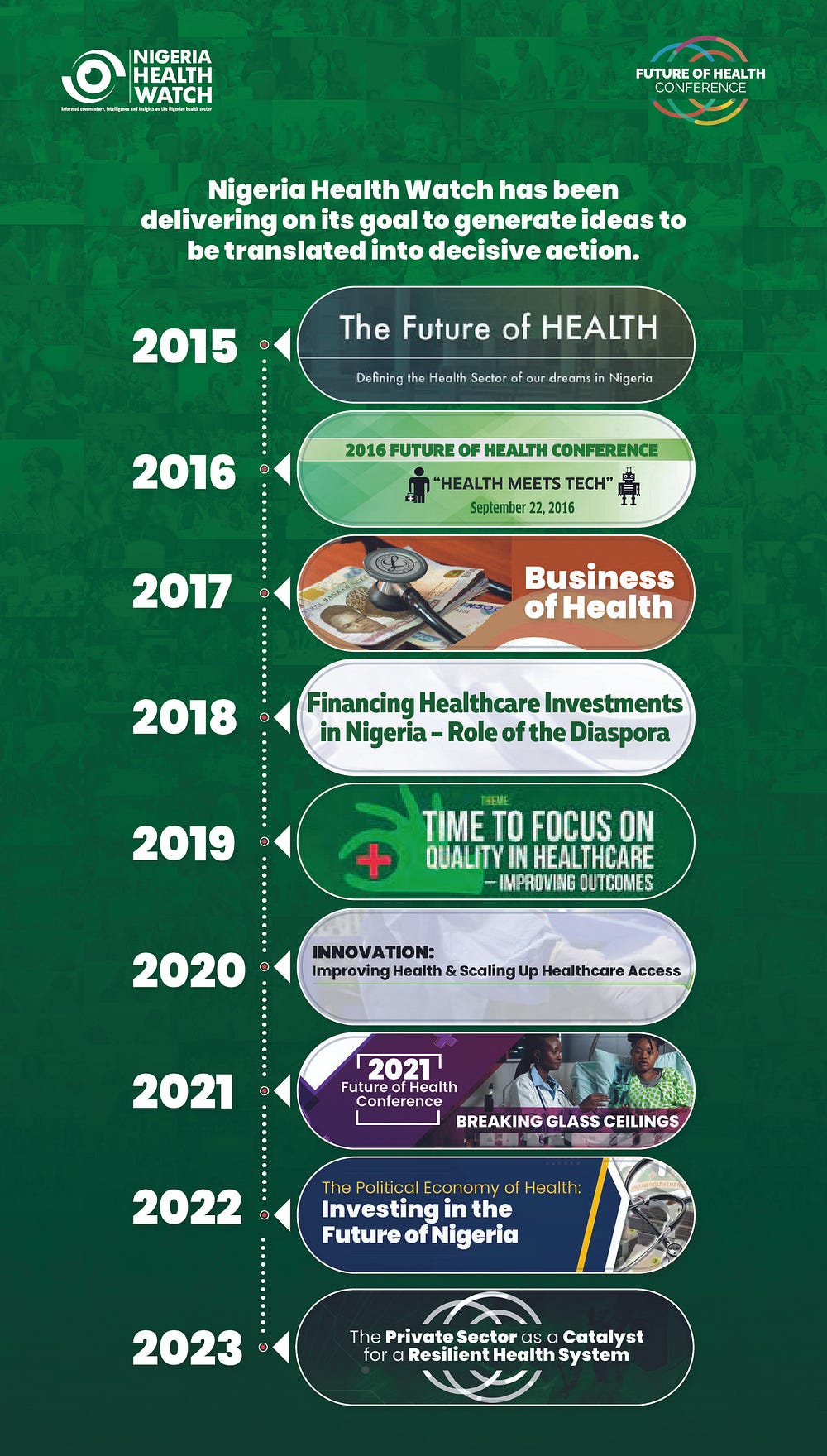
Private sector in building a resilient health system
The 9th edition of the Future of Health Conference focused on how the private sector can strengthen the government’s efforts in building a resilient health system. The healthcare system in Nigeria, although diverse, is a mixed healthcare system with the public and private sectors performing important roles. The Lancet Nigeria Commission recommended that Nigeria should leverage the private sector to expand innovation, research, and manufacturing capacities with government investments.
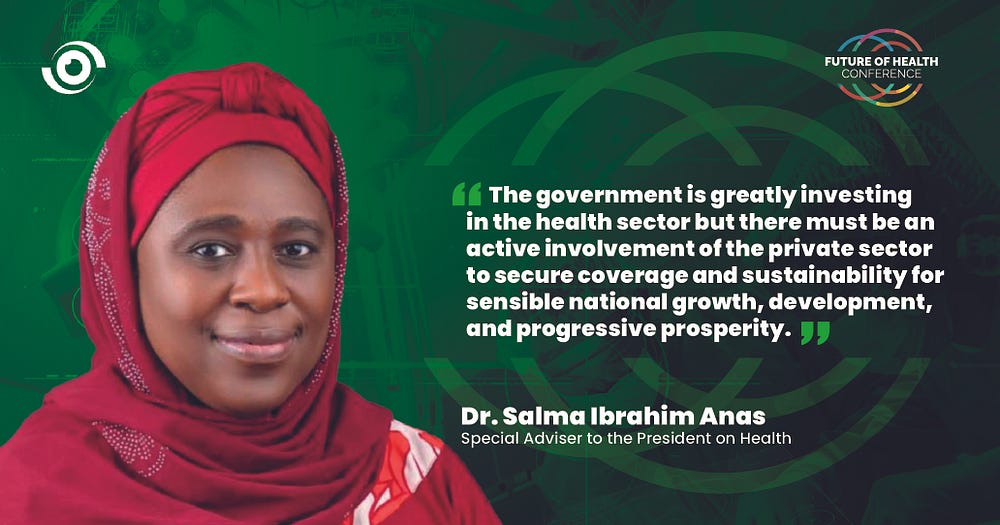
Focusing on the theme of the private sector catalysing a resilient health system, in her opening address, Dr Salma Ibrahim Anas, Special Adviser to the President on Health, said: “Building a resilient health system requires confidence, trust and is a collective responsibility where partnership is required and leveraging all potential within the private sector is necessary.” She noted this in a bid to emphasise the importance of working together for a desirable health system that would address the needs of the Nigerians.
According to the Honourable Coordinating Minister for Health and Social Welfare, Professor Muhammad Ali Pate, the timing of the conference was perfect given the multiple transitions the country is undergoing. He noted that all transitions, epidemiological and demographic, are critical for preserving and accumulating the human capital necessary for growth and prosperity.
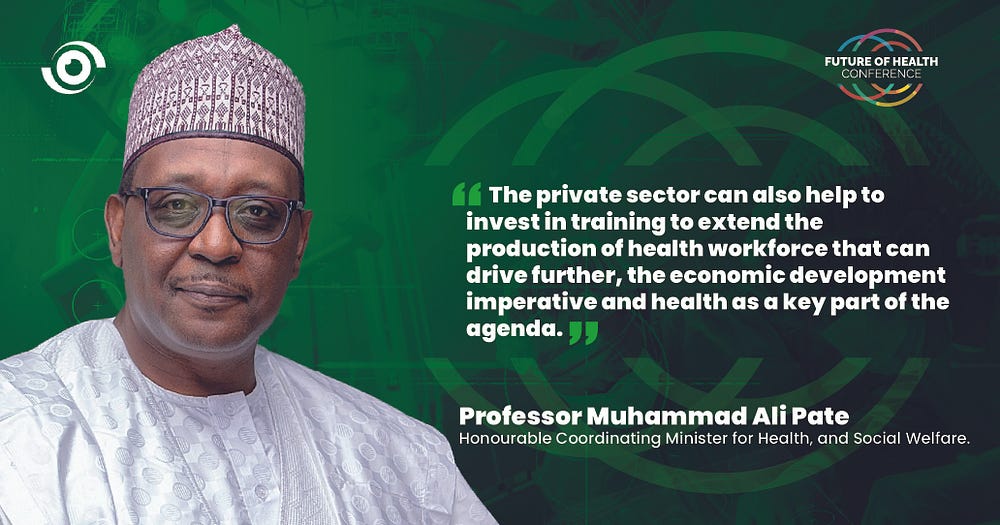
During his remarks, he stressed the importance of health investments as a driver of growth and prosperity and emphasised the need to incorporate various stakeholders into the current mixed health system in Nigeria. “We articulated a four-point agenda with a focus on improving the overall governance of health, bringing stakeholders together in the mixed health system that we have, public and private actors, civil society and listening to our citizens while responding to their needs,” he said.
Private Sector Financing for Health Systems Strengthening to Achieve Universal Health Coverage (UHC)
The first panel discussion focused on private-sector financing to achieve Universal Health Coverage (UHC). Funding for healthcare is a critical component of the health system that enables us to accelerate progress towards UHC. Achieving UHC is an ambitious goal, but it is possible with a substantial increase in domestic investments in healthcare. The current funding of 5.75% of GDP spent on healthcare is insufficient to meet the needs of the growing population.
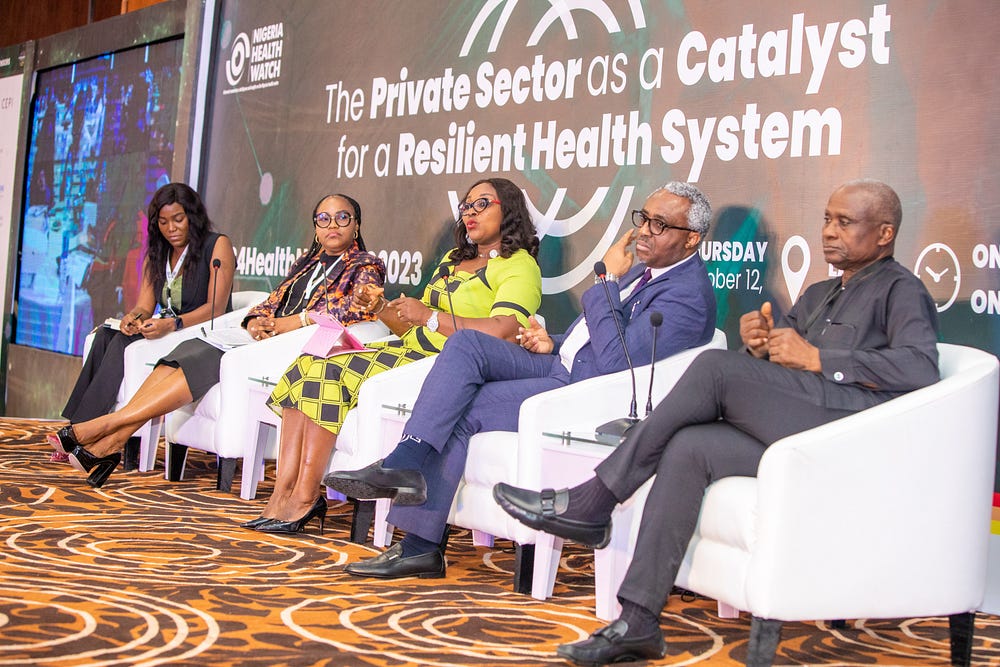
The private sector has an important role to play in the journey towards UHC, however, there needs to be an enabling environment, which includes instituting the necessary legislation and regulations for the private sector to flourish, said Dr Olajide Idris, former Commissioner of Health, Lagos State. So far, Nigeria has been unable to meet the 15% allocation to healthcare designated in the 2001 Abuja Declaration. The need for innovative funding mechanisms for healthcare through well-coordinated and regulated private-sector partnerships has become increasingly crucial in addressing the complex and evolving healthcare landscape. Such collaborations can drive efficiency, expand access, and enhance the quality of healthcare services while leveraging the expertise and resources of the private sector to supplement public funding, ultimately contributing to better healthcare outcomes and improved patient experiences.
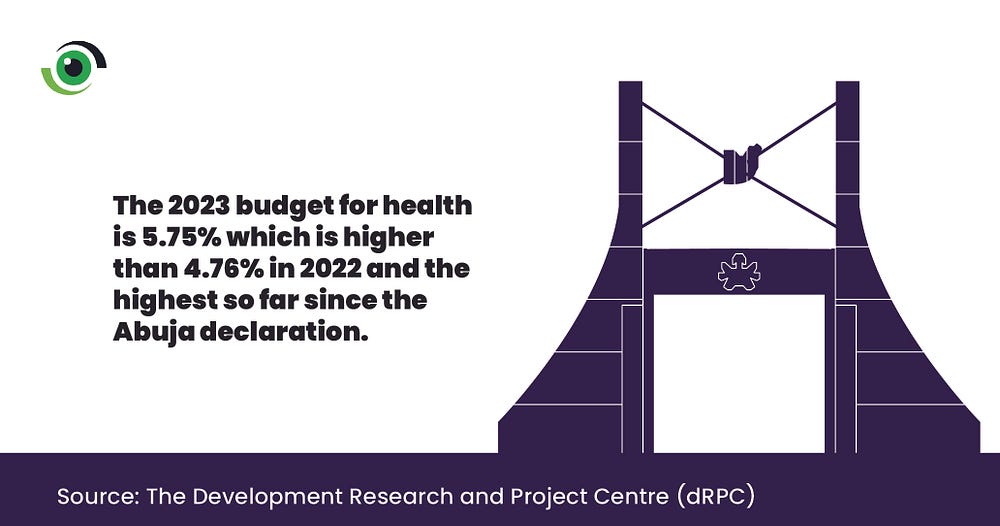
Currently, 80% of Nigerians pay out of pocket for healthcare at various healthcare facilities nationwide. Innovative approaches for achieving Universal Healthcare include options like premium financing, as well as forming partnerships with banks and telecom companies to enhance healthcare accessibility and affordability. “We also have telecoms, partnership with Airtel where people can pay with their data for microinsurance products”, explained Dr Jadesola Idowu, Chief Operating Officer of AXA MANSARD Health. Such innovative finance mechanisms can reduce the burden of out-of-pocket spending on the poor and vulnerable populations in Nigeria.
Private Sector Partnerships and Collaboration to Sustain the Diaspora “Brain Gain”
The emigration of health workers is a challenge that threatens the attainment of UHC in Nigeria. Health professionals are critical to obtaining Universal Health Coverage (UHC). However, the migration of health workers presents a challenge. The emigration of skilled health workers is disrupting healthcare delivery, particularly in underserved areas, hindering UHC objectives. Addressing this challenge requires coordinated efforts and innovative policies to retain health workers and ensure equitable access to healthcare services.
Nigerian health workers in the diaspora are equipped with valuable expertise, financial resources, and a commitment to their home country. Many are interested in returning to Nigeria and investing in the healthcare sector. “What we are doing is engaging them and showing them opportunities in areas where they can come and invest and be part of the rebuilding of our healthcare systems,” shared Mrs Njide Ndili, Country Director, PharmAccess, Nigeria. This trend signifies a remarkable opportunity for the nation’s health sector. Leveraging the knowledge, experience, and financial support of the diaspora can catalyse the development and modernisation of healthcare infrastructure, boost the quality of services, and extend access to care to underserved communities.
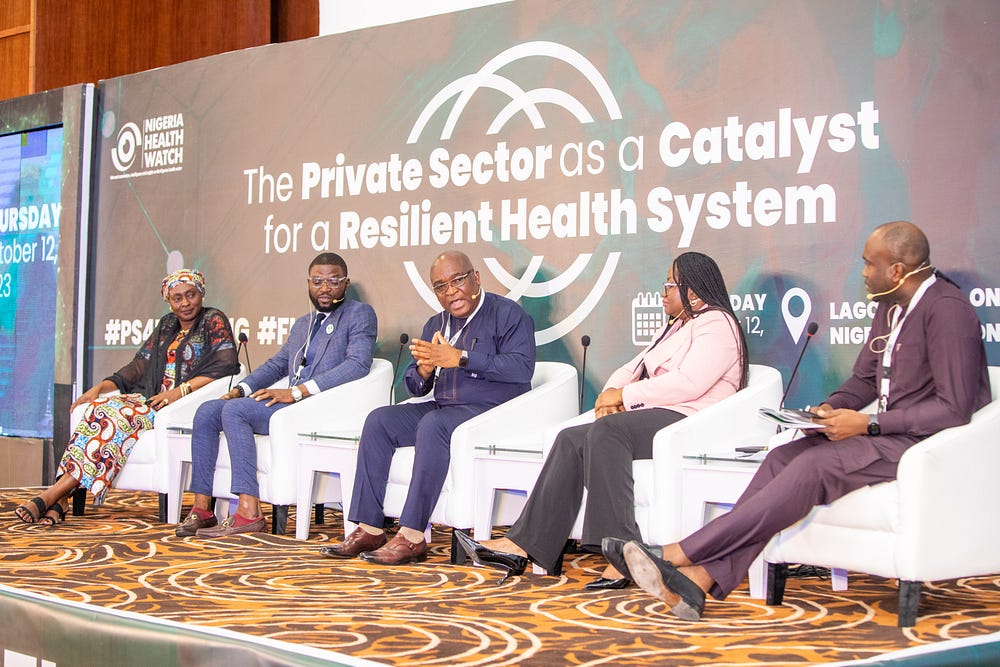
Dr. Benjamin Anyanwu, Executive Medical Director Regions Healthcare Hospitals and Specialist Clinics is a perfect example of “Brain Gain.” He established a neuroscience institute in Owerri, Imo State, a multi-specialty hospital, leveraging collaborative efforts between diaspora-trained and locally educated medical professionals.
Such collaborative ventures driven by the desire to create an enabling environment for healthcare professionals to return to Nigeria and offer their expertise is critical. However, according to Dr Ejim Egba Clement, President of the Nigerian Medical Students Association (NiMSA), ensuring an enabling environment is also critical to retaining prospective healthcare workers as well as those looking to return home from abroad.
Speaking on the panel on managing the issue of our brain drain, Professor Cheluchi Onyemelukwe, Managing Partner, Health Ethics and Law Consulting discussed the need for Nigeria to establish a framework to manage healthcare worker migration effectively. “We recognise that people are going to leave regardless of how wonderful things are. But there is always some kind of framework within which these things are done”. She mentioned that there was a need for policy coherence and policy implementation, particularly for harmonising policies such as the National Migration Policy and the National Diaspora Policy, which is currently under review.
There is a need to shift the narrative from “brain drain” to discussions about the positive contributions of the diaspora in the healthcare sector. Storytelling can be used as an effective tool to change mindsets and inspire others to return to Nigeria. Through stories, there is a need to not only highlight the challenges but also proffer solutions.
Leveraging the Private Sector for Quality Maternal Healthcare
The maternal mortality rate in Nigeria is 512 deaths per 100,000 live births, according to the Nigeria Demographic and Health Survey (NDHS). The delivery of quality maternal healthcare services depends on the entire healthcare system, and system-level issues such as human resources, policies and infrastructure can influence maternal health outcomes. “This is the time when private health sector providers cannot be ignored,” Dr Chito Nwana, Chief Medical Director (CMD) of Tabitha Medical Centre, said. There are shortages in human resources for health, economic resources, and infrastructure in the health system, and leveraging the private sector could potentially alleviate these gaps.
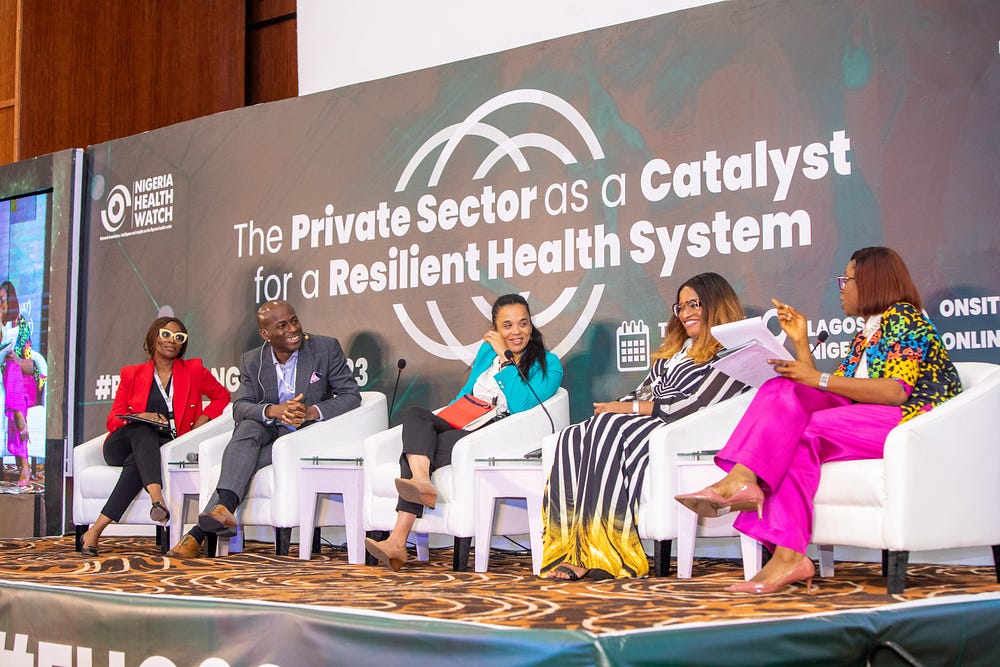
Technology-driven innovative healthcare solutions can help improve outcomes and drive quality improvements in maternal and child health. Dr Nneka Mobisson, CEO mDoc, shared how the company has made this possible through a pillar approach that caters to patients and providers utilising a wide array of technological and Artificial Intelligence solutions.
Nine out of ten maternal deaths are preventable with timely access to evidence-based maternal care, including contraception. Beyond technological solutions, Iyadunni Olubode, Director, Nigeria Programmes, MSD for Mothers shared how the organisation, through a project implemented by Society for Family Health in partnership with the Pharmacy Council of Nigeria (PCN), is using local solutions such as task-shifting and task-sharing to increase access to contraception. “The PCN have created a framework around drug shops, we call them PPMVs in Nigeria and many of these drug shops are in hard-to-reach areas. PCN has taken them through a process of training and accreditation, to ensure that quality does not slip” she said.
Public and private sector collaboration to improve maternal health care, requires the use of data and information to deliver services. However, the private and public sector can leverage initiatives like the World Health Organization Country Connector — an online resource centre that supports the public and private sectors in aligning around the common objectives of universal health coverage and collective health security and system resilience. “There’s a huge responsibility on our shoulders to deliver that access to world-class healthcare and to ensure that that collaboration with the public sector is firm,” Dr Tokunbo Shitta-Bey, CEO Dutchess International Hospital said.
Where do we go from here?
This year’s Future of Health Conference made it clear that a resilient healthcare system is possible through innovative collaboration between the public and private sectors in the country. In business and in entertainment, we have seen how strong partnerships between both sectors have delivered world class results and this is possible in the healthcare sector as well.
Speakers and panellists shared invaluable insights on the critical roles of the public and private sector in strengthening Nigeria’s healthcare system. This conference was not only a platform for discussion but also an opportunity for participants, both from the public and private sectors, to envision a brighter future for healthcare in Nigeria.
Watch the livestream from conference here, to gain further insights from the 2023 Future of Health Conference.


